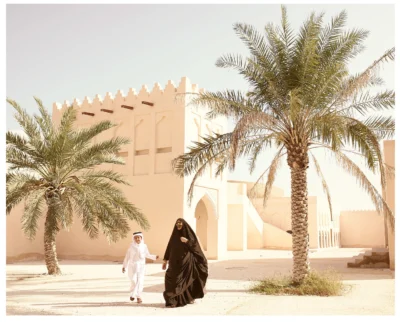
Press Release (ePRNews.com) - DOHA, Qatar - Dec 09, 2020 (UTC) - Qatar National Tourism Council (QNTC) has revealed its top 10 tips for those seeking an authentic Middle Eastern experience in the country when it reopens its borders. From centuries-old hosting traditions to Eid al-Fitr celebrations, the guide comes just in time for those looking ahead to where they hope to travel in 2021.
Maintaining and enhancing high standards of hospitality in Qatar is a priority for QNTC and the tourism sector, which prides itself on leaving visitors feeling welcome and cared for. The welcoming and friendly spirit of locals is embedded deep within the country’s culture and is something that can be found not only in the tourism sector but across all aspects of everyday life – from food and drink to social life, culture, religion and beyond.
Qatar National Tourism Council Secretary General and Qatar Airways Group Chief Executive, His Excellency Mr. Akbar Al Baker, said: “Here in Qatar, we take pride in our cultural heritage and look forward to every opportunity to share it with our international guests.
“As part of the Qatar National Vision 2030, which aims to bring prosperity to our nation, we’ve worked hard to ensure all visitors enjoy the highest standards of hospitality and service during their stay. We are continually strengthening our tourism offer as we welcome visitors to our country in 2021 and beyond.”
Top 10 insiders’ tips:
1. The art of Qahwa: Sharing coffee is an important part of Qatari social life, and the traditions around serving it are a testament to Qatar’s famed hospitality. Coffee is always served from a traditional coffee pot known as a ‘dallah’ and poured in the ‘finjaan’ (a delicate cup). Locals always hold their cup in the right hand and avoid filling the drink right to the top. Coffee drinking is so embedded in Qatari culture that it is considered impolite to refuse a cup!
2. A handy tip for dinner guests: Hosting guests for shared meals is a fundamental part of Qatari culture, with dining together a foundation of family and social life. A key tip to remember is that locals will only pass food with their right hand – so following this tradition will impress Qatari hosts. One of the best places for a traditional Qatari meal is Shay Al Shoomos, located within the Souq Waqif. Guests can sample a range of local specialties including margoga, small pieces of bread mixed with sauce and cooked vegetables, and regag, a traditional Arabic crepe.
3. A sip or two: Tourists can enjoy their favourite beverage in hotel restaurants across the country, of which there are plenty. For a special evening, it’s worth visiting Nobu Doha, which overlooks the Arabian Sea and the capital’s skyline, making it the perfect setting at sunset. Alternatively, La Cigale, voted the leading dining and entertainment experience in both Qatar and the Middle East, has a rooftop terrace to enjoy the Doha skyline by sunshine or starlight, located on the 15th floor.
4. The holy month: Ramadan takes place for 30 days every year and begins and ends depending on the sighting of the Moon. The holy month is observed by Muslims in Qatar and around the world and is used as a time of prayer, community and fasting. When the month ends, all come together for Eid al-Fitr – a period of celebration filled with feasting, storytelling and games. Ramadan and its fasting is one of the five pillars of the Islamic faith, and it’s respectful for those not observing it to be mindful of worship and fasting times. Should a visit to Qatar fall at this time, it’s worth checking the fasting times so you can celebrate breaking the fast with the locals each night.
5. Dress to impress: Qatar is relatively relaxed around dress, although it’s recommended for both men and women to cover their shoulders and knees. For those wanting to hop into a swimsuit and catch some rays, there are plenty of places to do so at one of the many private hotel pools or beaches. These include the Aleph Doha Residences by Hilton, which features Doha’s highest swimming pool, or the St Regis Doha, with its pristine white sand private beach.
6. And, relax: Wellness is well-rooted in Middle Eastern and Arabic culture, with the use of hammams dating back to the Middle Ages. For anyone looking to sit back and unwind on their visit to Qatar, there’s an abundance of spas to choose from with a wide range of relaxing treatments and amenities. The Sharq Village & Spa in Doha is recommended for its Ultimate Hammam Experience while the award-winning Zulal Wellness Resort, located in the most northern point of the country, is the largest of its kind in the region.
7. Mother tongue: While the majority of people speak English in Qatar, there is a large number of expatriates who bring a wealth of languages and dialects to this cosmopolitan destination. The official language, however, is Arabic – and learning a few words or phrases can demonstrate an interest in the country. The word for ‘hello’ is ‘marhabaa’ and ‘thank you’ is ‘shukraan’. For guests wanting to immerse themselves in Arabic culture, a visit to the National Museum of Qatar or the Museum of Islamic Art is not to be missed.
8. Hand-drawn henna: Considered a sunnah (a commendable Islamic practice), and used to decorate women’s hands, henna tattoos are mostly worn for special celebrations, such as weddings or Eid. Each pattern is unique and many families host henna night celebrations. To get a henna tattoo, visit the Souq Waqif where henna stalls operate throughout the year.
9. Holiday fun: Halfway through Ramadan, on the 14th day, Qataris celebrate Garangao, a fun tradition for children to recognise their fasting efforts. During Garangao, after the sunset prayer, children dress up in traditional clothes, carry a decorated bag, and visit their neighbourhoods singing Garangao songs, and collect treats, such as sweets or nuts. For those visiting Qatar with children during this time, there are ways to get involved with celebrations held across the country, including at the National Museum of Qatar or the Mall of Qatar.
10. Bird spotting: Falconry plays a vital role in the region’s history and is recognised by UNESCO as a living human heritage. The birds are trained to hunt and follow the commands of their handlers – the Bedouins. Travellers can visit the Falcon Souq, where these elegant birds sit on perches. There is an annual Qatar Falconry Festival, which is an unmissable event held in January, if you are lucky enough to be visiting at that time.
QNTC looks forward to welcoming international visitors for a truly authentic experience, rich in Qatari heritage and culture. To find more information on the culture and traditions of Qatar, please visit: https://www.visitqatar.qa/en/about-qatar/majlis-and-its-tradition-in-qatar
– Ends-
For media-related inquiries, please contact QNTC’s Press Office on:
+974 4499 7882 or +974 3392 4466 | pressoffice@visitqatar.qa
Source : Qatar National Tourism Council




